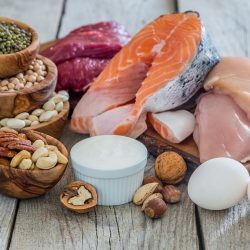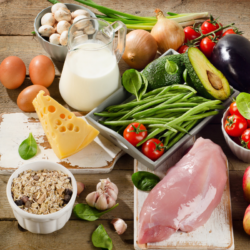Food cravings: a daily challenge for many people. In this article, we invite you to discover effective strategies and natural remedies for controlling them and maintaining optimal nutritional balance. The aim of a balanced diet is to meet our nutritional requirements in terms of macronutrients (proteins, fats and carbohydrates) and micronutrients (vitamins and minerals), according to individual needs, with the aim of controlling food cravings.
However, lack of time for ourselves, stress at work and in our daily lives, as well as irregular mealtimes, are all factors that can upset this dietary balance: for convenience and to save time, we turn to fast food, ready-made industrial dishes and other ready-to-eat preparations, most of which are very unbalanced.
How can we control our eating habits?
As well as causing overweight and obesity, the imbalance in our daily intake disturbs our food sensations.
Food sensations are the physiological feelings that tell us directly what our body needs.
- Hunger manifests itself when blood sugar levels fall, informing us that the body needs to eat. We recognise hunger when we feel tired or when our stomach gurgles.
- Satiation is the sensation that occurs during a meal, when the stomach gradually fills up.
- Satiety is the feeling of fullness in the stomach at the end of a meal, a state of ‘not being hungry’ that tells us we’ve eaten enough.
- Appetite is the desire to eat, in the expectation of gustatory pleasure. In general, this desire is directed towards a particular food group (sweet products, fatty products). It is not a food sensation, but an emotional feeling that encourages nibbling and weight gain.
It is cravings that regulate food intake rather than sensations: this is known as emotional eating. The desire to eat is therefore very different from the need to eat.
Learning to recognise our eating sensations enables us to identify our real needs and ultimately to stabilise our weight and maintain a good state of health.
Why do I often feel the urge to eat in the evening?
Increased food cravings in the evening can be attributed to several interdependent factors, often linked to circadian rhythms and emotional aspects.
The influence of circadian rhythms
Our bodies follow a natural sleep-wake cycle known as the circadian rhythm. At the end of the day, levels of the satiety hormone leptin may fall, while levels of the hunger hormone ghrelin tend to rise, leading to increased appetite.
Emotional and psychological factors
Emotionally, the evening is often a time to relax after a stressful day. This period can trigger comfort food cravings in response to stress, anxiety or fatigue. In addition, eating behaviours can be influenced by established habits or emotional associations with food as a source of comfort or reward.
Behavioural habits
Behavioural habits also play a role. If eating larger meals or snacks in the evening has become routine, the body will expect and demand food at these times, regardless of actual physical hunger.
Managing night-time cravings
To manage these cravings, it is advisable to establish regular eating routines throughout the day to avoid excessive hunger in the evening. Adopting relaxation and mindfulness techniques can also help to differentiate between physiological hunger signals and emotional eating.
By understanding the underlying mechanisms of your night-time cravings, you can put in place strategies to tackle them in a healthy and thoughtful way.
The role of hormones in food deviations
Overeating is often perceived as a lack of willpower, but in reality it is closely linked to our biology, in particular to the functioning of the hunger and satiety hormones: ghrelin and leptin.
Ghrelin: the hunger hormone
Ghrelin, secreted by the stomach when empty, acts as a chemical signal to the brain, triggering the sensation of hunger. It prepares the body to eat by increasing appetite and stimulating the release of growth hormone, which has an impact on our metabolism. When we ignore these hunger signals for an extended period of time, either by skipping meals or by following an overly restrictive diet, ghrelin levels rise, potentially leading to larger binges later on.
Leptin: The satiety hormone
In contrast, leptin is produced by fat cells and communicates with the hypothalamus in the brain to signal satiety. It helps regulate energy balance by inhibiting appetite, leading to a reduction in food intake and an incentive to burn calories. However, factors such as lack of sleep, stress and an unbalanced diet can disrupt leptin signalling, leading to feelings of hunger even when the body does not need extra calories.
Interactions and influences on food choices
Interactions between ghrelin and leptin are crucial for maintaining energy homeostasis. However, when this system is out of balance, it can lead to inappropriate food choices. For example, high levels of ghrelin can lead to impulsive food choices, opting for foods that are high in calories and low in nutritional value. Conversely, leptin resistance can contribute to a constant feeling of hunger, increasing the risk of overeating and weight gain.
How can we prevent food cravings?
To effectively prevent binge eating, it is essential to adopt behavioural and cognitive strategies that encourage intentional and conscious eating. Among these strategies, mindful eating and keeping a food diary are particularly beneficial.
Mindful eating
Mindful eating is the practice of paying full attention to the experience of eating, focusing on the physical sensations and emotional responses associated with eating. This technique involves eating slowly, savouring each mouthful and listening to your body’s signals of hunger and satiety. By engaging fully in the act of eating, you can recognise the emotional or environmental triggers that lead to deviations and learn to respond to these signals without resorting to food as a palliative.
Keeping a food diary
Keeping a food diary contributes to a better understanding of eating habits. It involves recording what you eat, how much you eat, the time of day, and the emotions or circumstances surrounding each meal or snack. This can reveal emotional eating patterns or times of day when we are more likely to overindulge. With this information, it is possible to develop personalised strategies for managing these at-risk situations.
Practical advice for implementation
- Start each meal by taking a moment to centre yourself and relax, so that you eat with intention and not in reaction to external or emotional stimuli.
- Use visual cues to assess portions, such as smaller plates or measuring devices, to maintain awareness of the quantities eaten.
- Refer regularly to your food diary to assess your progress and identify areas requiring further attention.
- Build in time for reflection after deviations to understand their origins and plan alternative responses for the future.
Adopting these strategies to prevent food deviations can significantly improve the quality of your diet and your relationship with food, by promoting more conscious choices that are in harmony with your body’s real needs.
These approaches form an essential part of an overall plan for managing food deviations, making it possible to achieve and maintain a healthy weight and cultivate lasting well-being.
What natural remedies should you choose to control your food cravings?
Explore the potential of homeopathy and aromatherapy for subtle, natural management of food cravings.
Homeopathy:
- For people obsessed with food: take IGNATIA AMARA 9CH + NATRUM MURIATICUM 9CH, 3 granules of each three times a day until cured.
- To calm the hunger of a big eater: take ANTIMONIUM CRUDUM 9CH, 3 granules three times a day.
- To calm nervous hunger after an upset: take IGNATIA AMARA 9CH, 3 granules three times a day.
Aromatherapy:
The PURESSENTIEL laboratories have developed an inhaler stick based on essential oils of :
- Bergamot,
- Ceylon cinnamon,
- Mandarin,
- Roman Chamomile,
- Clove.
An anti-snacking synergy that fools the brain into thinking you’ve just eaten.
FAQ
How can I manage sugar cravings?
Sugar cravings can be managed by several approaches. Firstly, make sure you eat balanced meals with protein, fibre and healthy fats to stabilise your blood sugar levels. Next, identify the emotional triggers that push you towards sugar and find healthy alternatives, such as fruit or plain yoghurt. It’s also advisable to gradually reduce the amount of sugar you eat, rather than stopping abruptly, to avoid cravings.
What impact does a food craving have on a long-term diet?
Occasional food deviations do not have a significant impact on a long-term diet, as long as they remain occasional and controlled. However, frequent deviations can lead to weight fluctuations, blood sugar imbalances and potentially reduced motivation. The key is to consciously incorporate these moments into your eating plan and maintain regularity in your healthy habits.
How do you get back on track after a lapse?
To get back on track after a dietary lapse, start by accepting that the lapse has occurred and avoid making yourself feel guilty. Replan your next meal by concentrating on nutritious foods and hydrate properly. Get back to your normal exercise routine and look on this lapse as a learning opportunity to better manage similar situations in the future.







